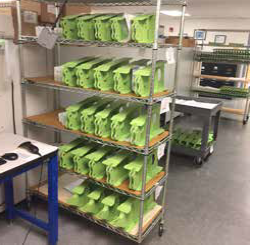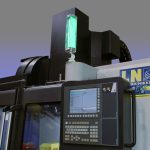Software keeps parts flying
Software keeps parts flying
Global Shop Solutions' ERP software provides information to all areas of King Machine's business by giving every employee the tools they need to do their jobs efficiently and accurately.
 Located in Mukilteo, Washington, just north of Seattle, King Machine, LLC manufactures precision CNC machined parts and assemblies for the aerospace industry. Operating out of a 26,000-sq.-ft. facility, the firm provides milling, turning, and assembly services that deliver quality and performance in every part. The company's precision parts and assemblies provide essential structural components for many of today's most popular aircraft.
Located in Mukilteo, Washington, just north of Seattle, King Machine, LLC manufactures precision CNC machined parts and assemblies for the aerospace industry. Operating out of a 26,000-sq.-ft. facility, the firm provides milling, turning, and assembly services that deliver quality and performance in every part. The company's precision parts and assemblies provide essential structural components for many of today's most popular aircraft.
Founded in 1978, King Machine serves some of the biggest names in the aerospace industry, including Boeing, Magellan Aerospace, GKN, Goodrich and Primus International. In 2013, senior managers and other industry professionals purchased the company, and continue to run it as a privately-held business. The ownership team averages 30 years' experience in the aerospace industry.
To meet the demanding requirements of its customers, King Machine utilizes CAD, CAM, NC program verification systems, and is ISO 9001:2008 and AS9100-C certified.
King Machine's old production management system had several holes in its system, including inventory management capabilities and a lack of integrated payroll and quality. To close the holes, ownership chose Global Shop Solutions ERP software for its "all-in-one" business management system.
"Global Shop Solutions offered a fully integrated system that included payroll and quality software," said King Machine president Keith Mehus. "We also liked the Document Control™ software, and the system's ease of use, which was essential for implementation and training."
Inventory accuracy of 99.98%
 In an industry that demands full traceability of materials, precise inventory control is a must. In King Machine's old system, inventory control and tracking were clunky at best. Incoming materials were received manually, as were material picks for each job. Lot bin tracking was virtually non-existent. To verify inventory levels, the company had to conduct a full inventory count every month.
In an industry that demands full traceability of materials, precise inventory control is a must. In King Machine's old system, inventory control and tracking were clunky at best. Incoming materials were received manually, as were material picks for each job. Lot bin tracking was virtually non-existent. To verify inventory levels, the company had to conduct a full inventory count every month.
With Global Shop Solutions ERP software, King Machine has totally revamped its inventory management system.
All incoming materials now receive barcode labels and are scanned directly into inventory, which makes tracking inventory levels and picking materials faster and more accurate. Instead of monthly inventory counts, managers now do one annual count, which averages a .02% or less correction rate.
According to Mehus, one of the most important changes has come from using the paperless software called GS Mobile. Using handheld and other mobile devices to interact with the ERP software, shop floor personnel can track and manage materials movement – in real time – from anywhere in the shop. "We can now move inventory from one bin to another and issue pick tickets to move materials to the job while documenting the transaction right there on the shop floor," he said. "GS Mobile is quick and convenient, especially with the pick tickets. It simplifies the process of getting the right materials to the right place at the right time. And we can trace every material from the time it comes in the back door to the time it goes out in a finished product with remarkable precision."
Accurate job costing helps win bids
 To survive and thrive in the fiercely competitive aerospace industry, companies must have the ability to accurately track job costs. Prior to Global Shop Solutions ERP software, job costing at King Machine was mostly a hit or miss process. Managers struggled to accurately capture direct labor, which made it difficult to determine costs at the job level. This, in turn, made it tough to determine which jobs made money and which ones didn't.
To survive and thrive in the fiercely competitive aerospace industry, companies must have the ability to accurately track job costs. Prior to Global Shop Solutions ERP software, job costing at King Machine was mostly a hit or miss process. Managers struggled to accurately capture direct labor, which made it difficult to determine costs at the job level. This, in turn, made it tough to determine which jobs made money and which ones didn't.
With its ERP software, King Machine tracks direct labor with a high degree of accuracy. Production workers clock into each job sequence using the Shop Floor Data Collection stations located throughout the job floor, and the system automatically assigns the time to the job. The system also simplifies the daily balancing process, making it easier to keep labor tracking up to date.
"Implementing lot bin tracking has also contributed to the ability to see our costs in real time," said Mehus. "Using the part number, we can log into the system to pinpoint the exact location of any job and who's working on it. We can also get an accurate reading of our current material costs in any given job and how much more labor is required."
"Knowing our true costs by the job allows us to see where we're making a profit and where we're not," said Mehus. "This data allows us to target the jobs that need improvement and see where we can focus more on our high-margin jobs. Most important, it allows us to win more bids by knowing our true margins."
Maintaining 97% on-time delivery and 99% quality
 During King Machine's first full year of using Global Shop Solutions ERP software, the company experienced a 40% increase in revenue. Rapid growth can often cause problems in other areas of the business, but thanks to the ERP software's data tracking capabilities, King Machine maintained its high on-time delivery and quality ratings.
During King Machine's first full year of using Global Shop Solutions ERP software, the company experienced a 40% increase in revenue. Rapid growth can often cause problems in other areas of the business, but thanks to the ERP software's data tracking capabilities, King Machine maintained its high on-time delivery and quality ratings.
Mehus attributed the 40% increase to his sales team's ability to successfully implement the company's growth strategy. Additionally, Global Shop Solutions ERP software aided on-time delivery and quality ratings by simplifying internal transactions and allowing the company to do more with less resources.
In particular, the system's document control software helped handle the increased workload in a smooth and efficient manner. With this feature, files, drawings, customer specs, updated rev versions, and other job-related documents can be attached to any major data entity in the system, such as work orders, sales orders and inventory lists. The documents are available to anyone on the shop floor or in the back offices.
"Document control produces phenomenal time savings because people can get everything they need through the shop floor data collection stations," said Mehus. "Shop floor workers no longer have to leave their stations to hunt down setup instructions or the latest rev version. Office personnel no longer waste time hunting through file drawers to find the document they need. It's all there in the system."
"We haven't totally eliminated paper from the shop floor, but we have drastically reduced it," he added. "Document Control also makes it easier to produce the documentation for all our materials, work steps and processes when customers audit us."
Integration of data
King Machine continues to use Global Shop Solutions ERP software to lean operations in all areas of the business including real-time costing, lot tracking, reducing paper, and efficient shipment staging.
The integrated payroll software reduces payroll costs by keeping the process internal. Built-in dashboards provide management with critical sales, customer and production data to make better decisions regarding products and customers. Quality software helps track and reduce scrap and resolve quality non-conformance issues.
For Mehus, it all comes down to having so many tools seamlessly integrated in one complete system. "We're an inventory-driven company that relies on our ability to get the product to our customers when we say we will," he said. "If our inventory isn't correct, we don't have what we need when we need it and we don't ship on time. With Global Shop Solutions, we can count on near-perfect accuracy in our lot bin transactions and our inventory counts so that we have what we need."
"These days, the driving factor in everything we do stems from the superb integration of data in Global Shop Solutions," concluded Mehus. "The software has made a difference in all areas of our business by giving every employee the tools they need to do their jobs efficiently and accurately."





